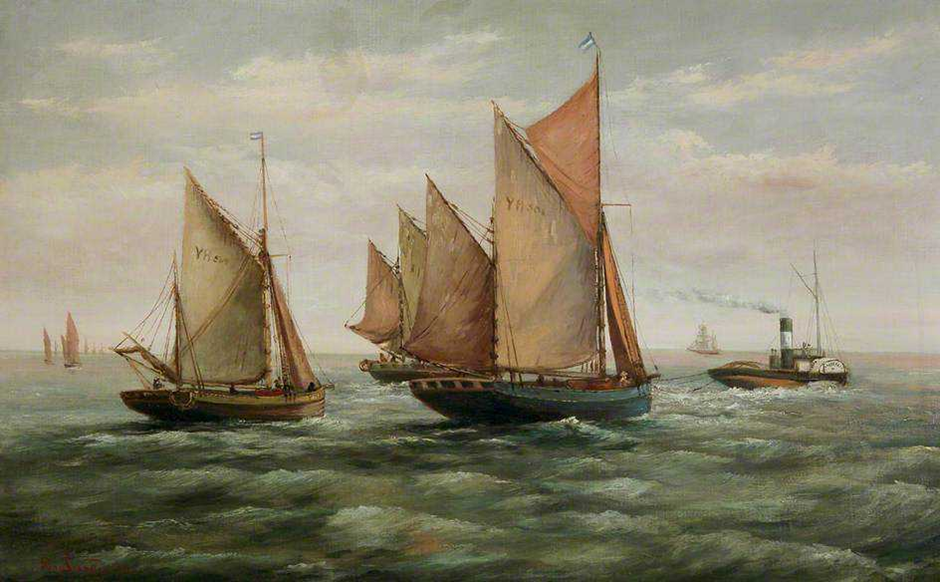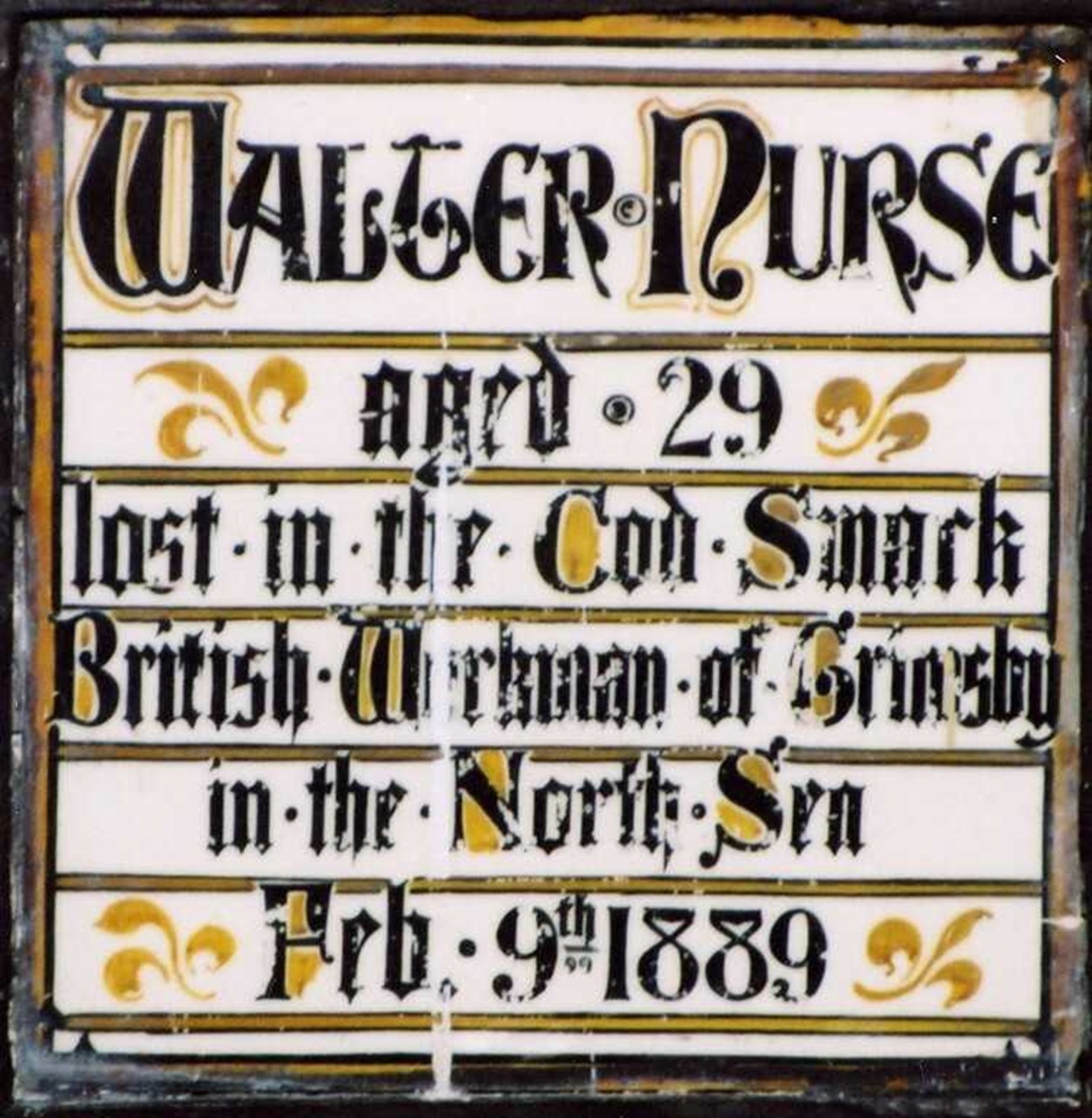
1st Dec 1867
“On Saturday, Sunday and Monday last the North Sea and German Ocean was visited by a series of the most terrific gales that have been known for very many years. Much damage has been caused thereby to scores of our fishing vessels and vessels of heavier tonnage have fared even worse than they. But we are sorry to have to state that not only have vessels been injured but lives held dear by many in Grimsby have been lost, and at the present time there are many tearful eyes and aching hearts anxious and aching for those that have not yet arrived in port. The damaged vessels keep dropping in one by one, and we trust that speedily the list will be completed, and that anxious minds may be set at rest….”
The above is the opening paragraph of ‘THE LATE GALES’ article from The Grimsby Herald.
Twelve Grimsby vessels were lost: Delight, Empress, Flirt, Guide, Hydrus, Increase, Liberty, Martha, Pink, Richard Cobden, Sceptre and Two Brothers. All these were fishing smacks.
In 1886 Grimsby had eight hundred and twenty of them. By 1892, steam power was established, and smacks had reduced to less than eight hundred, with one hundred and thirteen steam trawlers. By 1902, there were four hundred and fifty steam trawlers and no smacks, which had become worthless. (1)
9th February 1889
"As day after day passes and no tidings arrive of the missing Grimsby smacks, it is beginning to be realised that the gale of the 9th ult. will prove one of the most disastrous to the Grimsby fishing trade on record. altogether nearly a dozen fishing vessels, carrying between 60 and 70 hands, are missing. Most of the vessels were provisioned for eight or nine days, and many of them have been out for over a month. Of the safety of seven of them all hope has now been abandoned."
The above is from the Hull Times, 2 March 1889.
This storm claimed seven vessels from Grimsby: British Workman, Eton, Harold, John Wintringham, Kitten, Sea Searcher and Sir Frederick Roberts. Plus, two from Hull: Adventure and Olive Branch.
Of the seven vessels from Grimsby lost, Eton was the only steam trawler, and at one hundred and forty-four feet in length, was twice as long as the other six. Kitten was a schooner, the other five were a mix of Ketch and Dandy rigged smacks. Forty-six hands were lost.
British Workman was a Dandy and left Grimsby for the fishing grounds for the last time on the 26th of January. She carried seven hands all told, led by skipper: Edwin Green Smith, an experienced fisherman. This was his first trip on the British Workman.
By late February, after terrific gales early in the month, the likes of which had not been seen since 1883, no less than seven Grimsby smacks were reported overdue. The worst was feared for as many as 60 Grimsby fishermen. 20 men had been lost from the smacks that had made it back to port. The British Workman had left Grimsby with provisions for only a short single boat trip, so there was little hope left for her safety.
Those fears were realised when the smack Content of Grimsby returned, having witnessed the British Workman being reduced to a wreck.
The skipper of the Content said that about 8am on Saturday the 9th he saw a vessel laid-to, apparently all right despite the heavy sea conditions. He had his own crew on deck, ready for an emergency. At about ten past, the mate brought his attention to the other smack. It had been hit by a huge wave, stripping away the sails, leaving the gaff swinging. The boat and bulwarks were smashed away, leaving the smack a wreck.
He took a look through his marine glasses and noted the number GY11, positively identifying the smack as the British Workman. He saw the crew raise a distress signal on the mizzen, but he had enough to deal with keeping his own ship safe in such conditions. That was the last that was seen of the British Workman of Grimsby. (2)

A poem was penned by Beccles born, but Grimsby and Whitby based sailor William Delf for that storm. That broadsheet was sold to try and raise funds for the families of the bereaved: 'In memoriam of the poor Fishermen who lost their lives in the Dreadful Gale from Grimsby and Hull, Feb. 8&9, 1889'
In a tragic turn of fate, Delf himself was swept overboard and drowned at sea in 1893.
Methinks I see some little crafts
Spreading their sails a-lee
As down the Humber they did glide
Bound in the Northern sea
Methinks I see on each small craft
A crew with hearts so brave
Going to earn their daily bread
Upon the restless wave
Methinks I see them as they left
The land all far behind
Casting the lead into the deep
Their fishing grounds to find
Methinks I see them on the deck
Working with a will
To shoot their net into the deep
Either for good or ill
Methinks I see them shoot their trawl
Upon the Thursday night
And saw the watch upon the deck
And everything was right
Methinks I see them yet again
When daylight did appear
All hands working with a will
Getting off their gear
Methinks I see the net on board
And fish so fresh and gay
And all were busily engaged
Clearing them away
Methinks I see them put away
Into the ice below
And then the sea began to rise
And the wind did stronger blow
Methinks I heard the skipper say
‘My lads, we’ll shorten sail
As the sky to all appearance looks
Like an approaching gale’
Methinks I see them yet again
And all on board was right
With sails close reef’d, the deck cleared up
And sidelights burning bright
Methinks I see them yet again
The midnight hour was passed [sic]
Their little craft was battling there
With the fiery blast
Methinks I heard the skipper say
‘Cheer up, my lads, be brave
We’ll trust in Him who rules the deep
In Him who alone can save’
Methinks I read the thoughts of them
Who now are called away
They were thinking of their loved ones dear
Many miles away
Thinking of wife and children dear
And aged parents too
Who no more will see them here again
In this world below
Great God, Thou sees each sorrowing heart
The widow in distress
Thou knows the little children dear
Who now are fatherless
Comfort and cheer them here below
And lead them by Thy hand
And at last may they meet with their loved ones dear
In the promised land
This passed into oral tradition and became a song called “Three Score and Ten.” In so doing it lost six verses and acquired a new one (the last, in which an error of date occurs) together with a chorus and a tune. It has become well known in folksong clubs, and covered by many artists. Here it is sang by The Clancy Brothers:
Acknowledgements and References
I am grateful to Tracey Townsend from the Archives Office of Inspire Grimsby Ltd for providing the newspaper articles quoted and for confirmation of the storm of 1889. Tracey also made me aware of the song that it inspired.
Grimsby Public Library, where I wanted to visit, is currently removing all its contents to allow water damage repairs to its existing building.
Peter Chapman (2002) Grimsby, The Story of the World’s Greatest Fishing Port. For The Breedon Books Publishing Company (1)
Hull Daily Mail. 27th February 1889 (2)
NB. Ult. is short for ultimo, meaning “of or occurring in the month preceding the present.”